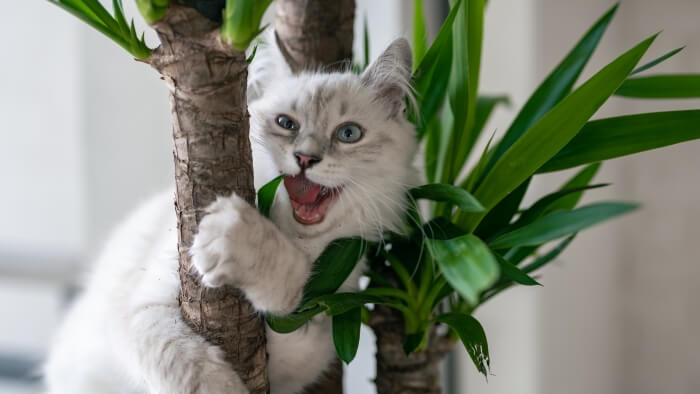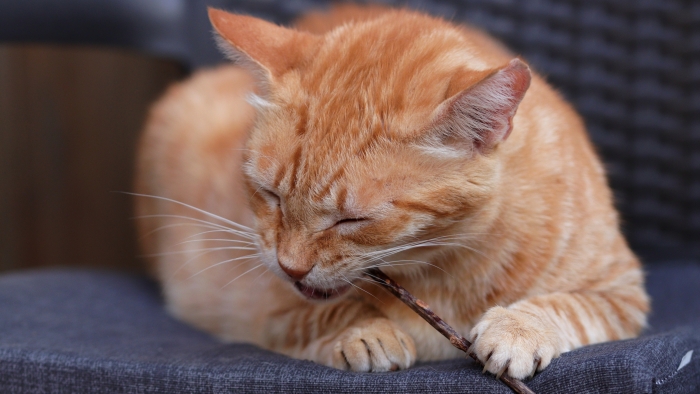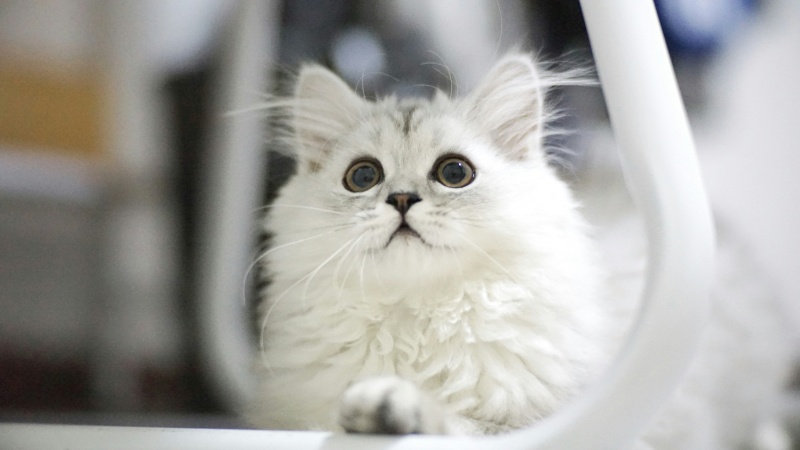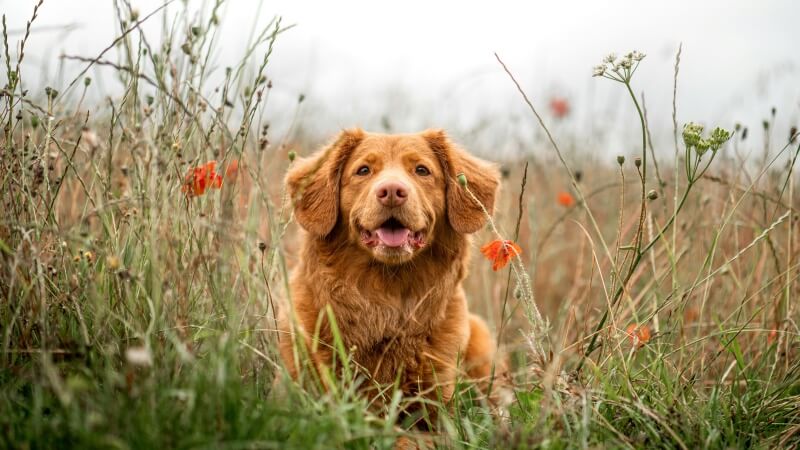
How To Craft A Cozy Cat Vest From Fabric Strips
Have you ever seen your feline friend lounging around and thought, “What could possibly make this picture more adorable?” The answer is simple: a cat

How to stop cats from eating plants? Most cat lovers aren’t just fans of felines, we often adore plants too. It’s unclear why this pairing is so common, but it’s definitely a FACT!
In this delightful twist of fate (where cat enthusiasts also cherish plants), we encounter a frequent dilemma. Cats are notorious for nibbling on indoor plants. Forget about them targeting the orchid that hasn’t bloomed in ages; if you’ve invested in an expensive Variegated Monstera, chances are they’ll opt to demolish that one instead.
Additionally, certain houseplants can be harmful to our feline friends. For a comprehensive list, take a look here.
To prevent our cats from snacking on our houseplants, it’s crucial to comprehend why they’re doing it in the first place (nutrient deficiency, boredom, desire for attention, etc.), and then provide a safe substitute that satisfies their needs, keeping them away from our beloved plants. The most popular strategies for addressing the usual motives include:
The initial step when you find your cat feasting on your plants is to figure out the potential causes of this plant-harming habit.
Nearly every instance of feline misbehavior can be traced back to a health problem, hunger, a need for attention, or insufficient physical activity.
It’s not unusual for cats to occasionally gnaw on plants, but it’s vital to recognize that this behavior can sometimes signal a deeper health issue. If your cat regularly chews on plants, a veterinary check-up is advisable.
Health problems that might lead cats to eat plants include dental issues, digestive troubles, and stress. A vet visit can confirm your cat’s well-being and provide any needed treatments.
Most strategies to stop plant nibbling won’t be effective unless the root cause is addressed. If cats are picky about the plants they eat, they may be seeking additional nutrients or fiber.
Offering your cat plants that you’re willing to share, like catnip or cat grass, is as crucial as curbing the behavior. Chewing on these safe, cat-friendly plants can fulfill their chewing urges and divert them from your more valued plants.
If your cat is seeking attention or trying to alleviate boredom, I strongly recommend spending more time with them.
Two or three robust play sessions daily should suffice. Leaving toys out can help, especially if you’re not always available.
Rotating these toys prevents them from becoming too mundane for your cat.
It’s quite possible your cat is munching on plants out of boredom, so ensuring they get 2-3 engaging play sessions daily is key.
If your cat seems disinterested in play, you might need to adjust your approach – remember, all cats have a predatory instinct.
Check out this video for insights on engaging your cat in play and understanding why they might not be playing with you!
If hunger, boredom, or a need for attention are ruled out, we may be dealing with a curious cat (whose interest in your plants might wane after a few days) or a cat specifically targeting certain plants (possibly in pursuit of fiber or missing nutrients).
Consulting with your veterinarian about such shifts in your cat’s behavior is always wise, particularly if your cat frequently eats plants.
I’ll begin with what I believe to be the most effective and quickest solutions, and then move on to some less obvious methods, including products you might use as a last resort.
Plus, if you read through to the end of this article, I’ll share tips on what to stop doing to avoid reinforcing negative behaviors and potentially upsetting your cat.
It might sound simple, but the most straightforward way to deter your cat from your plants is to put the plants out of your cat’s reach.
You can find hanging pots and hooks at any home and garden store. Not only do hanging plants keep them away from cats, but they also add aesthetic appeal.
Also, consider using rooms or spaces that are usually closed off as ideal spots for your houseplants.
I won’t dwell on this point much longer; its effectiveness is quite self-explanatory.
A transformative skill you can instill in your cat through clicker training is the command “NO” or “LEAVE IT”.
It’s crucial to balance teaching them to stop eating your plants without accidentally rewarding them for it.
If you’re new to clicker training, I suggest mastering positive reinforcement first before using it to enforce “NO”. Incorrect application could end up reinforcing the very behavior you’re trying to discourage.
Applying certain products to your plants can also discourage your cat from chewing on them. You have the option to either concoct your own homemade deterrent sprays or purchase them from pet stores or online. These won’t damage your plants but will make them less appealing to your cat.
An effective and inexpensive homemade solution can be made with ingredients you likely have at home. Mix water and vinegar. Cats dislike the smell, and it’s harmless to plants!
Another home remedy, though not as cheap, is an essential oil spray:
CAUTION NOTE: Cats have difficulty processing certain toxins like essential oils due to a lack of a key enzyme in their liver. They are especially sensitive to phenols and phenolic compounds present in some essential oils. The higher the concentration of essential oil, the greater the risk. A single drop diluted in water is usually safe, but caution is advised.
The best essential oils for this purpose include citronella, lavender, peppermint, or lemongrass. Choose your favorite; if it doesn’t work, there are three other options to try – available on Amazon.
Cayenne pepper is another suggested option, but it can cause harm if it gets in your cat’s eyes during cleaning, potentially leading to self-injury. I haven’t found concrete evidence supporting this, so if you know of any articles or blog posts that do, please share them in the comments!
Positive Punishment can be an effective method to curb certain feline behaviors. However, two potential consequences may arise from this approach:
Many cat owners resort to spraying their cats with water as a disciplinary measure, believing it will correct undesirable behaviors. However, this method can actually aggravate the problem.
Exposure to water sprays often causes cats to feel anxious and fearful. Such negative emotions can trigger additional behavioral issues, including the very act of eating plants.
Moreover, this induced anxiety can lead to more severe problems than the initial plant-eating behavior, such as urine spraying, compulsive scratching, or redirected aggression.
The strategy is to have the cat link nearing a plant with a negative experience, such as being sprayed in the face with air or water. Certain products, like sensor-activated air sprays, can aid in this. These devices act like booby traps, activating when the cat nears the plant.
This method won’t harm your cat but may instill a fear of the area around the plants, causing them to reconsider their approach. You can find these products on Amazon.
An alternative is to spray your cat with water from a distance. The key is to ensure the cat doesn’t connect the punishment with you. The idea is for the cat to believe the corrective action is spontaneous, so if you use this method, remain inconspicuous and avoid yelling while spraying.
Personally, I advocate for other disciplinary methods, like verbal cues or positive reinforcement, over using a water spray bottle to correct behavior.
The effectiveness of the tactics mentioned hinges on addressing the reason behind your cat’s plant chewing.
If your cat is choosy about the plants it eats, it could be seeking additional nutrients or fiber.
Offering your cat plants that you’re willing to share is just as important as stopping the unwanted behavior. Chewing on these cat-friendly plants, like catnip or cat grass, may fulfill their need to chew and divert them from your more valued plants.

If your cat is seeking attention or trying to alleviate boredom, it’s advisable to spend more quality time with them. Two or three engaging play sessions daily are usually sufficient.
Leaving toys out can also be effective when you’re not available. Remember to rotate the toys to keep your cat’s interest. If the toys become too familiar, they might be ignored.
How to stop cats from eating plants? If you’re finding this article helpful, you might want to explore our Website. We post weekly content aimed at enhancing your experience with your cat.
Before wrapping up, I need to highlight a few DON’Ts!
If your cat seeks affection, food, or play and you respond immediately with playtime, feeding, or cuddles when they target your plants, you’re inadvertently reinforcing that behavior. You’re essentially training your cat that attacking plants is a surefire way to get your attention. So, it’s crucial to STOP DOING THIS!
Also, avoid directly punishing your cat. This may deter them from approaching plants in your presence, but not when you’re away.
Moreover, your cat might start associating punishment with you, leading to fear or resentment, which is likely the opposite of your goal. Using a harness for controlled, supervised outdoor time can also redirect their attention from indoor plants.
Can cats distinguish between safe and toxic plants?
While cats have a keen sense of smell, they do not inherently know which plants are toxic and which are safe. Cat owners need to be aware of toxic plants and keep them out of reach. Research and understand which common houseplants might be harmful to your cat.
What are signs of nutritional deficiencies in cats that might lead them to eat plants?
Indicators of nutritional deficiencies in cats can include dull fur, lethargy, weight loss, or changes in appetite. If your cat is excessively chewing plants, it might be a sign that their diet needs to be assessed. Consult your vet for a balanced diet plan.
How can I make my cat more interested in their toys and less in my plants?
To increase your cat’s interest in toys, choose items that stimulate their natural hunting instincts. Toys that mimic the movement of prey, like feather wands or mouse-like toys, can be more appealing. Regularly introducing new toys can also keep their interest peaked.
Are there any specific plants that can safely satisfy a cat’s urge to chew?
Yes, plants like catnip, cat grass, or valerian can safely satisfy a cat’s urge to chew. These plants are not only safe but also provide a stimulating experience for cats. Always ensure the plants are pesticide-free and grown in a pet-safe manner.
How to discipline a cat – What are effective non-punitive methods?
When disciplining a cat, focus on positive reinforcement rather than punishment. Reward good behavior with treats, praise, or playtime. Consistent training, patience, and understanding your cat’s body language are key. Redirecting their attention to acceptable activities or toys when they exhibit unwanted behavior is also effective. Remember, consistency and patience are vital in training your cat without harming your bond.


Have you ever seen your feline friend lounging around and thought, “What could possibly make this picture more adorable?” The answer is simple: a cat

The moment you consider a dog hunting vest for your adventurous companion, you’re stepping into a world where safety meets functionality. This vest is not

The concept of a dog cooling vest is a game-changer for pet owners looking to enhance their dog’s comfort during those relentless summer days. Imagine

When you first consider crafting a tactical dog vest, it’s not just about embarking on a fun DIY project; it’s about ensuring your furry companion’s

Have you ever seen your feline friend lounging around and thought, “What could possibly make this picture more adorable?” The answer is simple: a cat

The moment you consider a dog hunting vest for your adventurous companion, you’re stepping into a world where safety meets functionality. This vest is not

The concept of a dog cooling vest is a game-changer for pet owners looking to enhance their dog’s comfort during those relentless summer days. Imagine

When you first consider crafting a tactical dog vest, it’s not just about embarking on a fun DIY project; it’s about ensuring your furry companion’s
Secure and Empower, Walk Responsibly
Copyright © 2025pettacticalharness. All Rights Reserved.